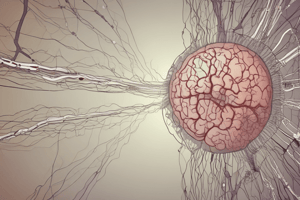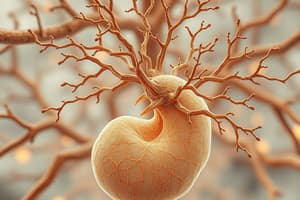Podcast
Questions and Answers
What structure becomes the grey matter in the spinal cord during development?
What structure becomes the grey matter in the spinal cord during development?
- Intermediate layer (correct)
- Alar plate
- Basal plate
- Marginal zone
Which layer contains neural processes but not neural cell bodies in the developing spinal cord?
Which layer contains neural processes but not neural cell bodies in the developing spinal cord?
- Marginal zone (correct)
- Basal plate
- Ependyma
- Grey matter
What type of nerve fibers are associated with the basal plates in spinal cord development?
What type of nerve fibers are associated with the basal plates in spinal cord development?
- Autonomic nerve fibers
- Sensory nerve fibers
- Dorsal root nerve fibers
- General somatic efferent and visceral efferent nerve fibers (correct)
Which structure is NOT part of the spinal cord developmental stages outlined?
Which structure is NOT part of the spinal cord developmental stages outlined?
In spinal cord development, what does the cord's maturation indicate?
In spinal cord development, what does the cord's maturation indicate?
Which signaling protein is responsible for preventing the dorsal ectoderm from forming neural tissue?
Which signaling protein is responsible for preventing the dorsal ectoderm from forming neural tissue?
Which two molecules are known as potent neural inducers that help facilitate the formation of neural tissue?
Which two molecules are known as potent neural inducers that help facilitate the formation of neural tissue?
What is the primary role of Sonic hedgehog (Shh) in embryonic development?
What is the primary role of Sonic hedgehog (Shh) in embryonic development?
Where do microglial cells, present in the spinal cord, originate from?
Where do microglial cells, present in the spinal cord, originate from?
Which of the following is not a signaling protein mentioned in the development of the nervous system?
Which of the following is not a signaling protein mentioned in the development of the nervous system?
What is the main function of the surface ectoderm in relation to BMP4?
What is the main function of the surface ectoderm in relation to BMP4?
During which phase of development do microglial cells appear?
During which phase of development do microglial cells appear?
Which of the following combinations correctly matches a signaling protein with its source?
Which of the following combinations correctly matches a signaling protein with its source?
What structure does the differential growth of the five secondary brain vesicles give rise to?
What structure does the differential growth of the five secondary brain vesicles give rise to?
Which group of motor neurons forms the nucleus of the abducens nerve?
Which group of motor neurons forms the nucleus of the abducens nerve?
What does the Edinger-Westphal nucleus innervate?
What does the Edinger-Westphal nucleus innervate?
Which of the following structures is part of the metencephalon?
Which of the following structures is part of the metencephalon?
Which brain structure forms the master regulatory center?
Which brain structure forms the master regulatory center?
What do the axons from the oculomotor nerve supply?
What do the axons from the oculomotor nerve supply?
What type of neurons migrate ventrally to form the pontine nuclei?
What type of neurons migrate ventrally to form the pontine nuclei?
What structures make up the rhombencephalon?
What structures make up the rhombencephalon?
What type of nerves are associated with the alar plates?
What type of nerves are associated with the alar plates?
What is the process of neuroblast development in spinal ganglia?
What is the process of neuroblast development in spinal ganglia?
Where do centrally growing processes enter in the spinal cord?
Where do centrally growing processes enter in the spinal cord?
What type of neurons are formed at the afferent dorsal root of the spinal cord?
What type of neurons are formed at the afferent dorsal root of the spinal cord?
What do the peripheral processes of neuroblasts join to form?
What do the peripheral processes of neuroblasts join to form?
What type of cells do neural crest cells differentiate into?
What type of cells do neural crest cells differentiate into?
What is not a type of flexure involved in brain development?
What is not a type of flexure involved in brain development?
What components do the dorsal root ganglia primarily contain?
What components do the dorsal root ganglia primarily contain?
Flashcards
BMP4
BMP4
A signaling protein produced by the surface ectoderm that inhibits the formation of neural tissue.
Sonic Hedgehog (Shh)
Sonic Hedgehog (Shh)
A signaling protein secreted by the notochord, crucial for embryonic development, particularly in the formation of the neural tube.
Hepatic Nuclear Factor-3β (HNF-3β)
Hepatic Nuclear Factor-3β (HNF-3β)
A signaling protein produced by the developing notochord, playing a role in neural development.
Noggin and Cordin
Noggin and Cordin
Signup and view all the flashcards
Neural Tube
Neural Tube
Signup and view all the flashcards
Neuroepithelium
Neuroepithelium
Signup and view all the flashcards
Neuroblast Formation
Neuroblast Formation
Signup and view all the flashcards
Microglial Cells
Microglial Cells
Signup and view all the flashcards
What is the ependyma?
What is the ependyma?
Signup and view all the flashcards
What is the ventricular system?
What is the ventricular system?
Signup and view all the flashcards
What is the gray matter?
What is the gray matter?
Signup and view all the flashcards
What is the white matter?
What is the white matter?
Signup and view all the flashcards
What are basal plates?
What are basal plates?
Signup and view all the flashcards
Alar Plates
Alar Plates
Signup and view all the flashcards
Basal Plates
Basal Plates
Signup and view all the flashcards
Dorsal Root Ganglia
Dorsal Root Ganglia
Signup and view all the flashcards
General Somatic Afferent Nerves
General Somatic Afferent Nerves
Signup and view all the flashcards
General Visceral Afferent Nerves
General Visceral Afferent Nerves
Signup and view all the flashcards
Special Visceral Afferent Nerves
Special Visceral Afferent Nerves
Signup and view all the flashcards
Neural Crest Cells
Neural Crest Cells
Signup and view all the flashcards
Pseudo-unipolar Neuron
Pseudo-unipolar Neuron
Signup and view all the flashcards
Rhombencephalon
Rhombencephalon
Signup and view all the flashcards
Myelencephalon
Myelencephalon
Signup and view all the flashcards
Metencephalon
Metencephalon
Signup and view all the flashcards
Pontine Nuclei
Pontine Nuclei
Signup and view all the flashcards
Mesencephalon
Mesencephalon
Signup and view all the flashcards
Tegmentum
Tegmentum
Signup and view all the flashcards
Study Notes
Nervous System Development
- Neuroblast is part of CNS & PNS development
- Signaling proteins influence development
- BMP4 from surface ectoderm
- Sonic hedgehog (Shh) from notochord
- Hepatic Nuclear Factor-3β from developing notochord
- Noggin
- Cordin
- BMP4 prevents dorsal ectoderm from forming neural tissue
- Sonic hedgehog is a chemical signal essential for embryonic development
- Noggin and Cordin block BMP4's influence, allowing neural tissue formation
Nervous System Structure
- Nervous system has central (CNS) and peripheral (PNS) components
- Diagram shows horse nervous system with spinal cord, brachial plexus and lumbosacral plexus. Major nerves are identified: femoral, radial, sciatic, ulnar, median, peroneal, palmar and tibial.
Signaling Proteins in Development
- BMP4 influences development, preventing neural tissue formation in the dorsal ectoderm.
- Sonic hedgehog (Shh) is an important chemical signal crucial for embryonic development.
- Noggin and Cordin block BMP4, promoting the formation of neural tissue.
Neuroblast Formation
- Neuroblasts migrate from the neuroepithelium into the developing mantle layer.
- Neuroblasts transform into bipolar cells with an axon and dendrite.
- The single dendrite typically degenerates, and multiple dendrites develop.
- Neuroblasts that don't form functioning connections degenerate.
Cell Lineages of the CNS
- Neuroepithelium gives rise to various cell types
- Neurons develop from neuroblasts.
- Astrocytes and oligodendrocytes are glial cells.
- Microglia are phagocytic cells derived from the mesoderm.
- Ependymal cells line the ventricles and central canal.
- Glial cells of the spinal cord originate from neuroepithelium.
- Microglia are derived from mesoderm.
- Glial cells are located in both peripheral and central nervous systems.
- Satellite and Schwann cells are part of the PNS.
- Oligodendrocytes and astrocytes are part of the CNS.
- Ependymal cells create and monitor cerebrospinal fluid.
- Microglia are immune cells, removing debris and pathogens.
Nervous System and Glial Cells
- Glial cells support and protect neurons.
- Schwann cells form myelin sheaths in the PNS.
- Oligodendrocytes form myelin sheaths in the CNS.
- Astrocytes support neuronal function and maintain the blood-brain barrier
- Microglial cells act as immune cells, removing waste and pathogens.
- Different types of glial cells have distinct functions.
Spinal Cord Development
- Ependyma and ventricular system are part of spinal cord development
- Spinal cord has distinct zones: Ventricular, intermediate zone, and marginal zone.
- The roof and floor plates of the spinal cord develop into dorsal and ventral structures.
- Basal plates contain general somatic and visceral efferent nerve fibers
- Alar plates contain general somatic and visceral afferent nerve fibers.
- Spinal cord development involves the formation of dorsal and ventral horns
Brain Development
- The prosencephalon (forebrain) gives rise to the telencephalon and diencephalon
- The mesencephalon (midbrain) develops into parts of the brain
- The rhombencephalon (hindbrain) differentiates into the metencephalon and myelencephalon.
- Different regions of the brain have distinct functions.
Cranial Nerves
- There are 12 pairs of cranial nerves.
- Each nerve has a specific function
- Nerves can have sensory, motor, or both functions
- Cranial nerves develop from different parts of the brain
Brain Flexures
- Brain flexures include cephalic, cervical, and pontine flexures
- Flexures reshape and reorient the developing brain
- Flexures affect the eventual position of different brain parts
Ventricular System and Choroid Plexus
- The ventricular system has cavities in the brain.
- The choroid plexus is a vascular structure in the ventricles.
- CSF is produced by the choroid plexus.
Other Important Terms
- Neuroepithelium: Layer of specialized cells that give rise to neurons and glia.
- Neuroblast: Immature neuron precursor cell.
- Myelin: Fatty insulating substance around nerve fibers, speeding up signal transmission.
- Neural tube: Embryonic structure that develops into the central nervous system.
- Nucleus: Cluster of neuron cell bodies.
- Ganglion: Cluster of neuron cell bodies outside the CNS.
Studying That Suits You
Use AI to generate personalized quizzes and flashcards to suit your learning preferences.




